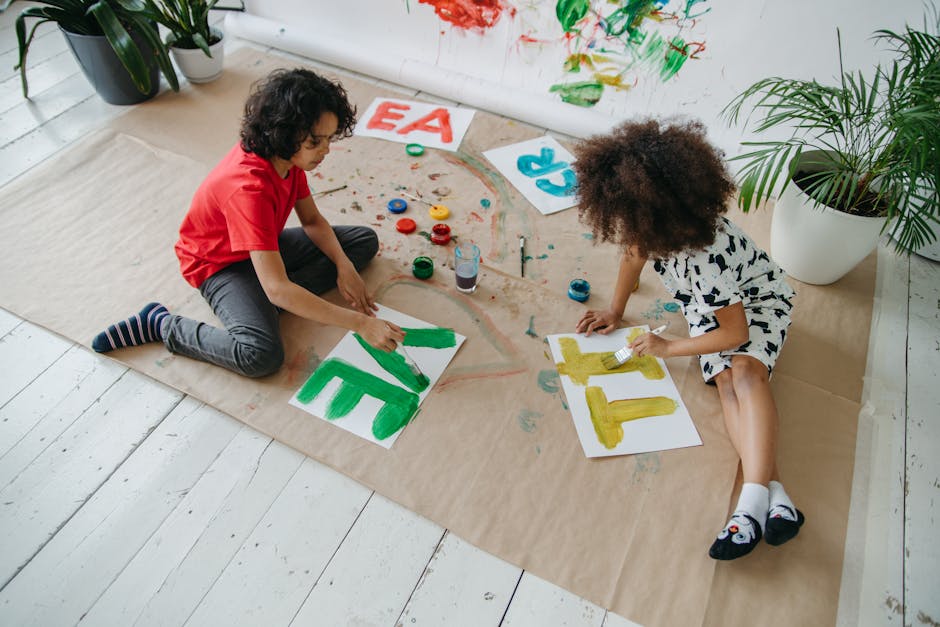How to Encourage Creativity Through Games
When we think of games, we often associate them with fun, entertainment, and relaxation. However, games also have a significant role in fostering creativity. From board games that require strategic thinking to video games that stimulate problem-solving skills, games have the power to ignite our imagination and innovation. In this article, we will explore the various ways in which games can encourage creativity, the benefits they offer, and how they can be effectively utilized to enhance our creative abilities.
The Psychology of Play

Play is an essential aspect of human development, and games are a structured form of play that can stimulate our cognitive processes. According to research in psychology, play allows us to explore, experiment, and test new ideas in a safe environment. When we engage in games, we activate different parts of our brain that are responsible for creativity, problem-solving, and critical thinking.
For example, puzzle games like Sudoku or crosswords require us to think critically and come up with unique solutions to complex problems. By challenging our minds in this way, we are exercising our creative muscles and honing our ability to think outside the box.
Freedom Within Constraints

One of the most interesting aspects of games is that they provide a set of rules and boundaries within which we can freely explore and create. This concept, known as “freedom within constraints,” is a powerful tool for encouraging creativity.
For instance, in a game like Minecraft, players are given the freedom to build and create whatever they can imagine within the limitations of the game world. This combination of freedom and structure allows players to unleash their creativity while also providing them with a framework to work within.
By setting boundaries and guidelines, games encourage us to think creatively within a defined space, pushing us to come up with innovative solutions to overcome challenges and achieve goals.
Collaboration and Communication

Many games, especially multiplayer games, require collaboration and communication between players to succeed. This aspect of games can greatly enhance our social and creative skills.
Games like “Among Us” or “Overcooked” rely on teamwork and coordination to achieve objectives. Players must communicate effectively, delegate tasks, and solve problems together, fostering a sense of community and cooperation.
By engaging in collaborative gameplay, individuals learn how to work with others, share ideas, and brainstorm solutions collectively. This not only enhances their creative abilities but also teaches important social skills that are valuable in various aspects of life.
Experimentation and Risk-Taking

Games provide a safe space for experimentation and risk-taking, allowing players to try out new strategies, fail without consequences, and learn from their mistakes. This aspect of games is crucial for nurturing creativity.
In games like “The Sims” or “SimCity,” players can experiment with different scenarios, make decisions, and observe the outcomes in a virtual environment. This trial-and-error process enables players to explore their creativity, test their ideas, and discover innovative solutions.
By encouraging risk-taking and embracing failure as a part of the learning process, games empower individuals to think creatively, take chances, and push the boundaries of their imagination.
Inspiration and Storytelling
Games have the power to inspire us, transport us to different worlds, and immerse us in captivating narratives. The storytelling element of games can spark our creativity and ignite our imagination in unique ways.
Games like “The Legend of Zelda” or “Final Fantasy” are renowned for their rich storytelling, engaging characters, and immersive worlds. These games not only entertain us but also inspire us to think creatively, dream big, and envision new possibilities.
By experiencing compelling narratives and exploring fantastical worlds, players are encouraged to create their stories, characters, and worlds. This process of storytelling can fuel our creative endeavors and help us express ourselves in imaginative ways.
Benefits of Encouraging Creativity Through Games
The benefits of encouraging creativity through games are vast and far-reaching. Not only do games stimulate our cognitive processes and enhance our problem-solving skills, but they also have a positive impact on various aspects of our lives.
Research has shown that engaging in creative activities like playing games can improve our mood, reduce stress levels, and boost our overall well-being. Creativity has also been linked to increased productivity, enhanced critical thinking, and better problem-solving abilities.
By incorporating games into our daily routine and utilizing them as a tool for fostering creativity, we can unlock our full creative potential, unleash our imagination, and cultivate a mindset of innovation and ingenuity.
Common Misconceptions About Creativity and Games
Despite the numerous benefits of encouraging creativity through games, there are several common misconceptions that surround this topic. One of the most prevalent misconceptions is that games are purely for entertainment and have no real-world applications.
On the contrary, games have been increasingly recognized for their educational value, cognitive benefits, and ability to stimulate creativity. From educational games that teach math and science concepts to puzzle games that enhance critical thinking skills, games have proven to be powerful tools for learning and growth.
Another misconception is that games are a solitary activity that hinders social interaction and communication. While it’s true that some games can be played alone, many games promote teamwork, collaboration, and socialization, fostering important interpersonal skills and enhancing creativity through interaction with others.
Conclusion
In conclusion, games have the remarkable ability to encourage creativity, stimulate innovation, and inspire us to think outside the box. By engaging in games that challenge our minds, spark our imagination, and foster collaboration, we can unlock our creative potential and cultivate a mindset of curiosity and exploration.
Whether you enjoy puzzle games, strategy games, or immersive storytelling experiences, there is a game out there for everyone that can ignite your creativity and help you unleash your full imaginative power. So, next time you pick up a controller, remember that you’re not just playing a game you’re embarking on a creative journey that has the potential to transform how you think, learn, and create.




